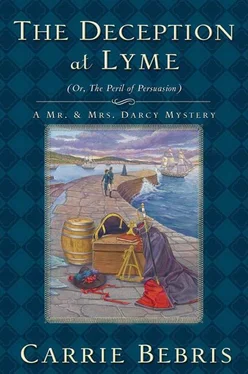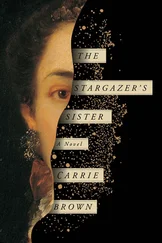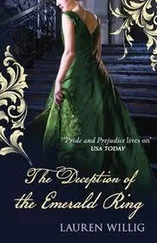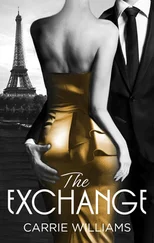“The Black Cormorant ,” Elizabeth said.
“You, Mrs. Darcy, may come work for me anytime,” said the admiral.
“No wonder Mr. Elliot wanted Captain Tourner as his ship’s master,” Elizabeth added. “Tourner had for years already been smuggling the contraband for him and his mysterious partner.”
Both St. Clair and the admiral regarded Elizabeth curiously. “How do you know about Mr. Elliot’s anonymous partner?” St. Clair asked.
“Mr. Darcy and I overheard the two of you talking. You were trying to persuade him to hire you, and asked to meet with his partner.”
St. Clair stared at her. “I thought he and I finished that conversation long before we met you and Mr. Darcy near the quay.”
Elizabeth looked at Darcy in rueful realization. She had just betrayed their discovery of the Cobb’s odd acoustical properties.
“You might as well tell them now,” Darcy said. “The knowledge could prove useful.”
Elizabeth described the whispering effect, which they all found astonishing.
“Well! If that is not the strangest thing I have heard this week, I do not know what is.” The admiral laughed and turned to St. Clair. “Instead of investigating the thieves, you could have just sat on the Cobb and waited for them to stroll along incriminating themselves.”
“That would certainly be easier than extricating information from Mr. Elliot.”
“Have you been able to determine the identity of his partner?” Darcy asked.
“I have long had my suspicions,” St. Clair said, “but they were confirmed two days ago on the Black Cormorant .” He paused, then looked at Georgiana. “It is Sir Laurence.”
“Sir Laurence?” she exclaimed, her astonishment echoed by all but the admiral. Darcy could hardly himself believe it, and for a moment thought St. Clair’s indictment was reciprocity for the baronet’s accusations against St. Clair. But then he recalled how well informed Sir Laurence had been about the merchant vessel on the day of its launch, how he had described it with such pride to Georgiana. Darcy had thought his sister’s suitor had wanted to impress her with his knowledge—now he realized the baronet had wanted to impress her with the ship itself.
Georgiana yet regarded St. Clair in disbelief. “That cannot be.”
“I am afraid it is, Miss Darcy. I am sorry—I know you consider him and his sister your friends. But I not only heard him discuss his ownership of the Black Cormorant with Captain Tourner—” St. Clair paused again, longer this time, his expression holding the regret of one about to give pain. “I saw him kill Tourner.”
“No!” She shook her head vehemently. “No—I know Sir Laurence. He could not possibly have committed such a wicked act.”
She looked to her brother with eyes that implored him to somehow refute St. Clair’s assertion. He would to heaven he could. Were it true, the baronet had sent Georgiana into Tourner’s cabin knowing the dead captain’s body was in the wardrobe—setting her up to make the discovery that would incriminate St. Clair. It was an act almost as unconscionable as the murder itself.
“How did you come to bear witness?” Darcy asked St. Clair.
“I went aboard earlier in the day, when the ship was still docked in the harbor, to talk to Tourner about coming on as first mate. The thought of serving under him again was abhorrent. I had originally—as you overheard, Mrs. Darcy—hoped to get hired on as the master, because I thought there would be a greater chance of direct contact with those at the highest level of the conspiracy; I had long suspected Sir Laurence was a party to the smuggling, but could never find any real evidence connecting him to it. Nearly everything goes through Mr. Elliot—Elliot is the middleman. But Mr. Elliot’s partner was determined to have Tourner, so my choices were serving as second-in-command or watching the ship sail off, taking with it the opportunity to finally complete this investigation.”
From the front of the house, the sound of a door opening indicated that Mrs. Smith’s chair bearers had arrived. St. Clair, however, ignored the noise and continued.
“I met with Tourner. He was quite full of himself—and not a little rum—and so condescending that I almost decided I would rather give up the investigation altogether than spend months sailing to Jamaica and back as his subordinate. Tourner said he would consider me. When we had done with our conversation, he could not trouble himself to see me off the ship, and I decided to have a covert look about. Tourner left his cabin for a while, and I sneaked back in to see what I could find. Unfortunately, Sir Laurence came aboard—so eager to see how his new ship handled now that she was fitted out enough for a run that he insisted Tourner take him on a test cruise.”
“If he goes to such trouble to distance himself from association with the smuggling, was he not concerned about the crew seeing him aboard?” Darcy asked.
“To them he was merely Tourner’s aristocratic friend, not the ship’s owner. Even so, that core crew is carefully chosen, every one of them a seaman who has worked on another ship the conspirators have used, who can be trusted to follow orders and keep his mouth shut.”
As St. Clair spoke, Georgiana rose and walked away from the table. Doubtless, what the captain was about to describe would be painful for her to hear, and Darcy could not blame her for wanting to listen from a place where her countenance could not be observed by everyone in the room. St. Clair’s concerned gaze followed her until she reached the window and looked upon the sea, her back to them all.
He returned his attention to those at the table and continued. “During the cruise, Sir Laurence was on deck with Tourner, but as the ship headed back it came to a stop not far from the Cobb. As the anchors lowered, I heard Sir Laurence and Tourner coming into Tourner’s cabin, so I hid in his cot, drew closed the bed curtains, and lay still. I dared not shift enough to peer through the curtains; as you saw, the cot is suspended, and I feared any movement would draw notice.
“They shared a drink in celebration of the ship’s performance. The bottle poured more after that—I know not how many times for each of them, but I expect the balance listed to one side—and Tourner’s speech became less guarded. ‘We will be able to move the gold in greater quantities now,’ he said. ‘That should please you. I could see in your face when you first laid eyes upon it that you wanted to get it to England in all haste.’ Sir Laurence made no reply. Tourner continued, saying that Mr. Elliot had told him everything was arranged with their friends among the preventive men. Sir Laurence confirmed that Tourner should encounter no trouble from the revenue authorities upon his return, and enquired how soon the Black Cormorant could set sail.
“Tourner said that the ship was nearly fitted out. The guns were to be installed the following day; all she needed was the rest of her crew. He then put my name forward for his mate. Sir Laurence rejected me irrefutably. Tourner declared that, as master, the Black Cormorant was his ship and he should be able to choose whomever he wanted. Sir Laurence said no, the Black Cormorant was his ship, and the argument escalated from there.”
Though it was warm in the study, Georgiana crossed her arms in front of her and rubbed her hands against them as if cold. She continued to stand facing the window, but stole surreptitious glances at St. Clair.
“Tourner was a man emboldened by liquor,” St. Clair said. “In my days as his second, half my job while preparing for battle was privately monitoring his consumption so I knew what to anticipate during the action. He took offense at Sir Laurence’s manner—he was a senior captain in His Majesty’s navy, by God, deserving of respect. Then he reminded Sir Laurence how long he had been part of their ‘private business’—and of how much he knew.
Читать дальше












